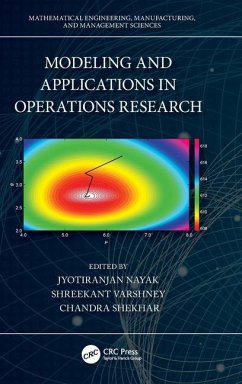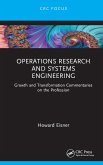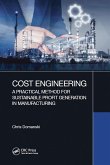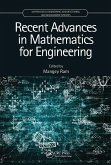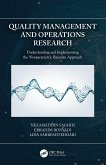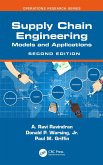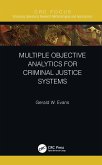Modeling and Applications in Operations Research
Herausgeber: Shekhar, Chandra; Varshney, Shreekant; Nayak, Jyotiranjan
Modeling and Applications in Operations Research
Herausgeber: Shekhar, Chandra; Varshney, Shreekant; Nayak, Jyotiranjan
- Gebundenes Buch
- Merkliste
- Auf die Merkliste
- Bewerten Bewerten
- Teilen
- Produkt teilen
- Produkterinnerung
- Produkterinnerung
The text envisages novel optimization methods that significantly impact real-life problems, starting from inventory control to economic decision-making. It discusses topics such as inventory control, queueing models, timetable scheduling, fuzzy optimization, and the Knapsack problem.
Andere Kunden interessierten sich auch für
![Operations Research and Systems Engineering Operations Research and Systems Engineering]() Howard EisnerOperations Research and Systems Engineering68,99 €
Howard EisnerOperations Research and Systems Engineering68,99 €![Cost Engineering Cost Engineering]() Chris Domanski (Purchasing Senior Manager, Nexteer Automotive, MI)Cost Engineering63,99 €
Chris Domanski (Purchasing Senior Manager, Nexteer Automotive, MI)Cost Engineering63,99 €![Recent Advances in Mathematics for Engineering Recent Advances in Mathematics for Engineering]() Recent Advances in Mathematics for Engineering66,99 €
Recent Advances in Mathematics for Engineering66,99 €![Quality Management and Operations Research Quality Management and Operations Research]() Nezameddin FaghihQuality Management and Operations Research143,99 €
Nezameddin FaghihQuality Management and Operations Research143,99 €![Applied Design Research in Living Labs and Other Experimental Learning and Innovation Environments Applied Design Research in Living Labs and Other Experimental Learning and Innovation Environments]() Applied Design Research in Living Labs and Other Experimental Learning and Innovation Environments65,99 €
Applied Design Research in Living Labs and Other Experimental Learning and Innovation Environments65,99 €![Supply Chain Engineering Supply Chain Engineering]() A. Ravi Ravindran (USA Penn State Univ)Supply Chain Engineering157,99 €
A. Ravi Ravindran (USA Penn State Univ)Supply Chain Engineering157,99 €![Multiple Objective Analytics for Criminal Justice Systems Multiple Objective Analytics for Criminal Justice Systems]() Gerald W. Evans (University of Louisville, Kentucky, USA)Multiple Objective Analytics for Criminal Justice Systems73,99 €
Gerald W. Evans (University of Louisville, Kentucky, USA)Multiple Objective Analytics for Criminal Justice Systems73,99 €-
-
-
The text envisages novel optimization methods that significantly impact real-life problems, starting from inventory control to economic decision-making. It discusses topics such as inventory control, queueing models, timetable scheduling, fuzzy optimization, and the Knapsack problem.
Hinweis: Dieser Artikel kann nur an eine deutsche Lieferadresse ausgeliefert werden.
Hinweis: Dieser Artikel kann nur an eine deutsche Lieferadresse ausgeliefert werden.
Produktdetails
- Produktdetails
- Mathematical Engineering, Manufacturing, and Management Sciences
- Verlag: Taylor & Francis Ltd
- Seitenzahl: 244
- Erscheinungstermin: 29. November 2023
- Englisch
- Abmessung: 242mm x 162mm x 22mm
- Gewicht: 546g
- ISBN-13: 9781032407371
- ISBN-10: 1032407379
- Artikelnr.: 68475349
- Herstellerkennzeichnung
- Libri GmbH
- Europaallee 1
- 36244 Bad Hersfeld
- gpsr@libri.de
- Mathematical Engineering, Manufacturing, and Management Sciences
- Verlag: Taylor & Francis Ltd
- Seitenzahl: 244
- Erscheinungstermin: 29. November 2023
- Englisch
- Abmessung: 242mm x 162mm x 22mm
- Gewicht: 546g
- ISBN-13: 9781032407371
- ISBN-10: 1032407379
- Artikelnr.: 68475349
- Herstellerkennzeichnung
- Libri GmbH
- Europaallee 1
- 36244 Bad Hersfeld
- gpsr@libri.de
Jyotiranjan Nayak is a Professor in the Department of Mathematics at the Faculty of Science and Technology (IcfaiTech), IFHE, Hyderabad, India. Prior to this, he was Associate Professor at the Institute of Technical Education and Research, Siksha "O" Anusandhan University, Bhubaneswar, India, and has more than 32 years of teaching experience in undergraduate and postgraduate engineering studies. He taught the subjects like differential equations, vector analysis, complex analysis, linear algebra, numerical methods, optimization techniques, discrete mathematics, and advanced calculus at the undergraduate level. He taught postgraduate students algebra, cryptography, number theory, real analysis, topology, combinatorics, graph theory, and operations research. For Ph.D. students, he has delivered lectures on advanced computational mathematics, matrix algebra, and design of experiments at different universities, including Utkal University, Biju Patnaik University of Technology, Berhampur University, Siksha "O" Anusandhan, and ICFAI University. Besides, he has been a guest and visiting faculty at many other universities in the country. He obtained his Ph.D. degree from Utkal University in 2005. His research areas include non-convex programming, fuzzy optimization, optimal control, and topology optimization. He has published 12 research papers in leading national and international journals. He is also the former associate editor of The Journal of Orissa Mathematical Society. He was Vice-President of the Operational Research Society of India (ORSI), Bhubaneswar chapter. He is an executive member of the Orissa Mathematical Society (OMS) and a life member of the Indian Society for Technical Education (ISTE), Orissa Information Society (OITS), and Ramanujan Society of Mathematics and Mathematical Sciences (RSMSS). Shreekant Varshney is Assistant Professor in the Department of Mathematics, School of Technology (SoT), Pandit Deendayal Energy University, Gandhinagar, Gujarat, India. Before this, he worked as Assistant Professor in the Department of Mathematics at the Faculty of Science and Technology (IcfaiTech), IFHE, Hyderabad, India. He obtained his Ph.D. degree from the Birla Institute of Technology and Science Pilani, Pilani Campus, in 2020. He is actively involved in the research areas, namely queueing theory, machine repair problem (MRP), optimal control, reliability and maintainability, stochastic modeling, sensitivity analysis, evolutionary computation, statistical analysis, fuzzy set and logic, etc. He has taught undergraduate subjects such as linear algebra, differential equations, complex analysis, advanced calculus, numerical methods, and probability and statistics. He also has experience in teaching courses like research methodology, stochastic modeling, and introduction to queueing theory for Ph.D. students. Besides attending, presenting scientific papers, and delivering invited talks in FDPs, he has organized several workshops and symposiums. He has been awarded second prize in the academic writing competition organized by SIAM journal publishing. He has 13 research articles in journals of high repute, namely, Reliability Engineering and System Safety, Journal of Computational and Applied Mathematics, Quality Technology and Quantitative Management, Arabian Journal of Science and Engineering, etc. He is also a reviewer of many reputed journals. As a professional, he has visited IIRS (ISRO), CSIR-IIP, and WIHG. Chandra Shekhar, the Professor and Ex-HoD of the Department of Mathematics at BITS Pilani, India, is actively involved in research and teaching in the area of queueing theory, computer and communication systems, machine repair problems, reliability and maintainability, stochastic processes, evolutionary computation, statistical analysis, and fuzzy set and logic. He has expertise in the subjects of probability and statistics, differential equations, linear algebra, advanced calculus, complex variables, and statistical inference at the undergraduate level of teaching. He has taught real analysis, topology, cryptography, applied mathematics, computational mathematics, cybernetics, and many more at the post-graduation level. He has been a pioneer in evolutionary computation, Markovian and stochastic modeling, research methodology, and queueing analysis and its applications. Besides attending, presenting scientific papers, and delivering invited talks at national/international conferences and FDPs, he has organized many conferences, workshops, and symposiums as a convener and as an organizing secretary. The best research paper award has been bestowed at the international conference. He has 48 research articles in these fields in journals of high repute and has supervised two Ph.D. theses. Besides some book chapters in an edited book published by the publisher of international reputation, authorship of the textbook titled Differential Equations, Calculus of Variations and Special Functions and the edited book titled Mathematical Modeling and Computation of Real-Time Problems: An Interdisciplinary Approach is also to his credit. He is also a member of the editorial board and a reviewer of many reputed journals, academic societies and Doctoral Research Committee, advisory board, faculty selection committee, and the examination board of many governments and private universities, institutions, or research labs. As a professional, he has visited¿ IIRS (ISRO), CSIR-IIP, NIH, WIHG, CPWD, NTPC, Bank of Maharashtra, and APS Lifetech.
Chapter 1
Ant colony optimization algorithm for the university course timetabling
problem using events based on groupings of students
Rakesh P. Badoni, Sanjeev Kumar, R.P. Mohanty, and Ashirbad Sarangi
Chapter 2
Genetic Optimization and Their Applications
Tusar Kanti Mishra, Vaibhav Bhartia, and B. K. Tripathy
Chapter 3
Different Variants of Unreliable Server: An Economic Approach
Shreekant Varshney, Chandra Shekhar, Vivek Tiwari, and Kocherlakota Satya
Pritam
Chapter 4
Multi-Objective Fuzzy Linear Programming Problem with Fuzzy Decision
Variables: A Geometrical Approach
Admasu Tadesse, M. M. Acharya, Manoranjan Sahoo, Srikumar Acharya
Chapter 5
On Approximation of Piecewise Linear Membership Functions and its
Application to Solve Solid Transportation Problem with Fuzzy Cost
Coefficients
Pradip Kundu, and Manidatta Ray
Chapter 6
Profit Maximization Inventory Model for Non-Instantaneous Deteriorating
Items with Imprecise Costs
D. K. Nayak, S. K. Paikray, and A. K. Sahoo
Chapter 7
A Fuzzy Inventory Model with Permissible Delay in Payments for Non-
Instantaneous Deteriorating Items under Inflation
Vipin Kumar, Amit Kumar, Chandra Shekhar, C. B. Gupta
Chapter 8
Single and Multi-Objective Optimization Problems with Pentagonal Fuzzy
Number
Anuradha Sahoo, Jayanta Kumar Dash, Ruchika Moharana
Chapter 9
Sensitivity Analysis of Fuzzy Linear Programming Problems with Symmetric
Trapezoidal Fuzzy Numbers
Sanjaya K. Behera, and J. R. Nayak
Chapter 10
Constrained Effective Bit Selection Algorithm for Solving 0-1 Knapsack
Problem
Rajpal Rajbhar, and L. N. Das
Chapter 11
A Transportation Model with Rough Cost, Demand, and Supply
Subhakanta Dash, and S. P. Mohanty
Chapter 12
Impact of COVID-19 on the World Economy
Altaf Ahmad, Anjanna Matta, and Topunuru Kaladhar
Chapter 13
Food Waste: Impact of Covid-19 on Urban and Rural Areas
Surya Kant Pal, Mahesh Kumar Jayaswal, Subhodeep Mukherjee, Kriss Gunjan,
Jyotirmai Satapathy, Simran Singh
Chapter 14
A Conceptual Study of Association Factors Contributing to the Stress Level
of Parents During the Pandemic Era in NCR
Nitendra Kumar, Pooja Singh, Santosh Kumar, Surya Kant Pal, Khursheed Alam,
Mahesh Kumar Jayaswal
Ant colony optimization algorithm for the university course timetabling
problem using events based on groupings of students
Rakesh P. Badoni, Sanjeev Kumar, R.P. Mohanty, and Ashirbad Sarangi
Chapter 2
Genetic Optimization and Their Applications
Tusar Kanti Mishra, Vaibhav Bhartia, and B. K. Tripathy
Chapter 3
Different Variants of Unreliable Server: An Economic Approach
Shreekant Varshney, Chandra Shekhar, Vivek Tiwari, and Kocherlakota Satya
Pritam
Chapter 4
Multi-Objective Fuzzy Linear Programming Problem with Fuzzy Decision
Variables: A Geometrical Approach
Admasu Tadesse, M. M. Acharya, Manoranjan Sahoo, Srikumar Acharya
Chapter 5
On Approximation of Piecewise Linear Membership Functions and its
Application to Solve Solid Transportation Problem with Fuzzy Cost
Coefficients
Pradip Kundu, and Manidatta Ray
Chapter 6
Profit Maximization Inventory Model for Non-Instantaneous Deteriorating
Items with Imprecise Costs
D. K. Nayak, S. K. Paikray, and A. K. Sahoo
Chapter 7
A Fuzzy Inventory Model with Permissible Delay in Payments for Non-
Instantaneous Deteriorating Items under Inflation
Vipin Kumar, Amit Kumar, Chandra Shekhar, C. B. Gupta
Chapter 8
Single and Multi-Objective Optimization Problems with Pentagonal Fuzzy
Number
Anuradha Sahoo, Jayanta Kumar Dash, Ruchika Moharana
Chapter 9
Sensitivity Analysis of Fuzzy Linear Programming Problems with Symmetric
Trapezoidal Fuzzy Numbers
Sanjaya K. Behera, and J. R. Nayak
Chapter 10
Constrained Effective Bit Selection Algorithm for Solving 0-1 Knapsack
Problem
Rajpal Rajbhar, and L. N. Das
Chapter 11
A Transportation Model with Rough Cost, Demand, and Supply
Subhakanta Dash, and S. P. Mohanty
Chapter 12
Impact of COVID-19 on the World Economy
Altaf Ahmad, Anjanna Matta, and Topunuru Kaladhar
Chapter 13
Food Waste: Impact of Covid-19 on Urban and Rural Areas
Surya Kant Pal, Mahesh Kumar Jayaswal, Subhodeep Mukherjee, Kriss Gunjan,
Jyotirmai Satapathy, Simran Singh
Chapter 14
A Conceptual Study of Association Factors Contributing to the Stress Level
of Parents During the Pandemic Era in NCR
Nitendra Kumar, Pooja Singh, Santosh Kumar, Surya Kant Pal, Khursheed Alam,
Mahesh Kumar Jayaswal
Chapter 1
Ant colony optimization algorithm for the university course timetabling
problem using events based on groupings of students
Rakesh P. Badoni, Sanjeev Kumar, R.P. Mohanty, and Ashirbad Sarangi
Chapter 2
Genetic Optimization and Their Applications
Tusar Kanti Mishra, Vaibhav Bhartia, and B. K. Tripathy
Chapter 3
Different Variants of Unreliable Server: An Economic Approach
Shreekant Varshney, Chandra Shekhar, Vivek Tiwari, and Kocherlakota Satya
Pritam
Chapter 4
Multi-Objective Fuzzy Linear Programming Problem with Fuzzy Decision
Variables: A Geometrical Approach
Admasu Tadesse, M. M. Acharya, Manoranjan Sahoo, Srikumar Acharya
Chapter 5
On Approximation of Piecewise Linear Membership Functions and its
Application to Solve Solid Transportation Problem with Fuzzy Cost
Coefficients
Pradip Kundu, and Manidatta Ray
Chapter 6
Profit Maximization Inventory Model for Non-Instantaneous Deteriorating
Items with Imprecise Costs
D. K. Nayak, S. K. Paikray, and A. K. Sahoo
Chapter 7
A Fuzzy Inventory Model with Permissible Delay in Payments for Non-
Instantaneous Deteriorating Items under Inflation
Vipin Kumar, Amit Kumar, Chandra Shekhar, C. B. Gupta
Chapter 8
Single and Multi-Objective Optimization Problems with Pentagonal Fuzzy
Number
Anuradha Sahoo, Jayanta Kumar Dash, Ruchika Moharana
Chapter 9
Sensitivity Analysis of Fuzzy Linear Programming Problems with Symmetric
Trapezoidal Fuzzy Numbers
Sanjaya K. Behera, and J. R. Nayak
Chapter 10
Constrained Effective Bit Selection Algorithm for Solving 0-1 Knapsack
Problem
Rajpal Rajbhar, and L. N. Das
Chapter 11
A Transportation Model with Rough Cost, Demand, and Supply
Subhakanta Dash, and S. P. Mohanty
Chapter 12
Impact of COVID-19 on the World Economy
Altaf Ahmad, Anjanna Matta, and Topunuru Kaladhar
Chapter 13
Food Waste: Impact of Covid-19 on Urban and Rural Areas
Surya Kant Pal, Mahesh Kumar Jayaswal, Subhodeep Mukherjee, Kriss Gunjan,
Jyotirmai Satapathy, Simran Singh
Chapter 14
A Conceptual Study of Association Factors Contributing to the Stress Level
of Parents During the Pandemic Era in NCR
Nitendra Kumar, Pooja Singh, Santosh Kumar, Surya Kant Pal, Khursheed Alam,
Mahesh Kumar Jayaswal
Ant colony optimization algorithm for the university course timetabling
problem using events based on groupings of students
Rakesh P. Badoni, Sanjeev Kumar, R.P. Mohanty, and Ashirbad Sarangi
Chapter 2
Genetic Optimization and Their Applications
Tusar Kanti Mishra, Vaibhav Bhartia, and B. K. Tripathy
Chapter 3
Different Variants of Unreliable Server: An Economic Approach
Shreekant Varshney, Chandra Shekhar, Vivek Tiwari, and Kocherlakota Satya
Pritam
Chapter 4
Multi-Objective Fuzzy Linear Programming Problem with Fuzzy Decision
Variables: A Geometrical Approach
Admasu Tadesse, M. M. Acharya, Manoranjan Sahoo, Srikumar Acharya
Chapter 5
On Approximation of Piecewise Linear Membership Functions and its
Application to Solve Solid Transportation Problem with Fuzzy Cost
Coefficients
Pradip Kundu, and Manidatta Ray
Chapter 6
Profit Maximization Inventory Model for Non-Instantaneous Deteriorating
Items with Imprecise Costs
D. K. Nayak, S. K. Paikray, and A. K. Sahoo
Chapter 7
A Fuzzy Inventory Model with Permissible Delay in Payments for Non-
Instantaneous Deteriorating Items under Inflation
Vipin Kumar, Amit Kumar, Chandra Shekhar, C. B. Gupta
Chapter 8
Single and Multi-Objective Optimization Problems with Pentagonal Fuzzy
Number
Anuradha Sahoo, Jayanta Kumar Dash, Ruchika Moharana
Chapter 9
Sensitivity Analysis of Fuzzy Linear Programming Problems with Symmetric
Trapezoidal Fuzzy Numbers
Sanjaya K. Behera, and J. R. Nayak
Chapter 10
Constrained Effective Bit Selection Algorithm for Solving 0-1 Knapsack
Problem
Rajpal Rajbhar, and L. N. Das
Chapter 11
A Transportation Model with Rough Cost, Demand, and Supply
Subhakanta Dash, and S. P. Mohanty
Chapter 12
Impact of COVID-19 on the World Economy
Altaf Ahmad, Anjanna Matta, and Topunuru Kaladhar
Chapter 13
Food Waste: Impact of Covid-19 on Urban and Rural Areas
Surya Kant Pal, Mahesh Kumar Jayaswal, Subhodeep Mukherjee, Kriss Gunjan,
Jyotirmai Satapathy, Simran Singh
Chapter 14
A Conceptual Study of Association Factors Contributing to the Stress Level
of Parents During the Pandemic Era in NCR
Nitendra Kumar, Pooja Singh, Santosh Kumar, Surya Kant Pal, Khursheed Alam,
Mahesh Kumar Jayaswal

